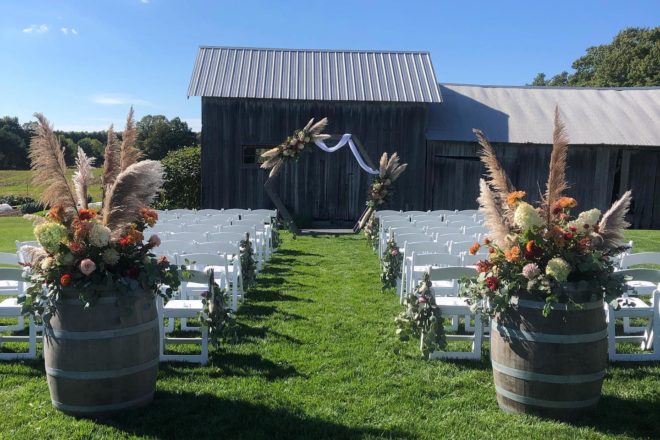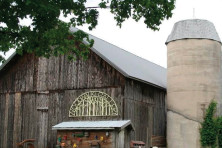Alcohol Bill Puts Wedding Barns in Limbo
- Share
- Tweet
- Pin
- Share

When Gov. Tony Evers signed a new bill overhauling the state’s complex alcohol regulatory system on Dec. 6 (AB 304), it was hailed as a historic compromise between producers, distributors, hotels and the Wisconsin Tavern League.
The bill passed with rare bipartisan support (a 22-11 vote in the state Senate, and 88-10 in the state Assembly). But while the bill reduces complexities for wineries, breweries, distillers and distributors, owners of event venues and wedding barns said it may force them to close because of limits on the number and type of events they can host.
Under the provisions of the new law specific to event venues – which take effect in two years – renters will no longer be treated as a private party able to bring their own alcohol to serve to their wedding guests. Instead, venues will have to obtain one of two special liquor licenses to host the event. Legislators and Evers have said these licenses allow event venues to operate as they always have, but a close reading of the new legislations shows that’s not the case.
Lucas Vebber, attorney for the Wisconsin Institute for Law and Liberty, said his firm expects to bring a legal challenge to the law soon.
“This is just a pretext to ban wedding barns,” Vebber said. “It’s a very poorly-written and bizarre statute.”
No-Sale Event Venue Licenses
One of the two special liquor licenses under the new law is the no-sale event venue license that allows renters to provide their own beer and wine (but not hard liquor) for guests to consume at a wedding or event. But the venue is only allowed to host up to six of these licensed events – and only one of those per month.
Lucas Lindow, who operates About Thyme Farm in Baileys Harbor, said that’s not nearly the same as the 10 events per year he can host today.
“If I can only host one per month and six a year, do they expect me to host an event in the barn in April or May?” Lindow asked. “I don’t think that’s realistic.”
The no-sale license also stipulates that if a caterer is used at the event, the beer and wine must be purchased through the caterer – which would apply to nearly every wedding and event hosted at a wedding barn, driving up costs for those using the venue for their event.
“We may have to host more events to make it pay off,” said Matthew Villalpando, who bought Woodwalk Gallery with his wife in 2022, “and the ones we do host will be a lot more expensive for families if they’re going to have to buy liquor at retail prices.”

Lindow said he has no desire to make money off of alcohol sales but feels the state is forcing him into that business by limiting the events he can host. Under county zoning Lindow was already limited to 10 events, and with the new rule he’ll be limited even further. Last year he shifted his business from exclusively weddings to hosting more community events, such as the Ridges Festival of Nature, a Climate Change Coalition dinner, and an Ephraim Yacht Club fundraiser. The new law could make it cost-prohibitive to host those fundraisers because Lindow will be forced to make more money from the six events he can host.
“You can’t expect those nonprofits to shell out $100 a person to have your Festival of Nature event here,” he said. “That’s just lunacy.”
Above-Quota Liquor License
The second license for event venues under the new law is an above-quota liquor license that a venue will automatically qualify for if it meets certain criteria. That requires that a venue hosted at least five events with at least 50 attendees and brought in at least $20,000 in revenue from property rentals in the previous year.
Though the law makes the license available, it will be up to the municipality whether to award the license to the venue, according to the Wisconsin Legislative Council’s guidance on the law.
“I don’t know if we’ll be able to get a license or not,” Villalpando said. “If not, we’ll be in big trouble.”
Villalpando said the 15-18 weddings and events they host between June and September are a critical portion of their annual revenue.
The law does not make it clear if venues with the new above-quota liquor license will be able to operate like any other tavern, or if they will only be able to serve liquor for certain types of events.
Then there are those wedding barns that operate under conditional-use permits that may not allow for a liquor license at all.
The Tavern League of Wisconsin, which supported the law and in particular the new regulations for wedding barns, did not respond to the Peninsula Pulse’s requests for comments.
“To me that’s almost like the Tavern League working against the businesses they’re trying to support,” Lindow said. “It’s going to change the dynamic. You’re going to push a lot of weddings to other places like Michigan, the U.P., and Illinois. It’s a lot more reasonable to go to Woodman’s or Costco and purchase your alcohol.”
James Larsen, owner of Husby’s Food and Spirits and Garden Gables wedding barn, said the law is an overreach by the Tavern League that could have adverse consequences for the county.
“In Door County, where are you going to get married?” Larsen said. “If you take away a bunch of these wedding barns, it’s not like we have a lot of open venues here. That’s where the Tavern League is just missing on a lot of this stuff, by eliminating the ability of these large groups to assemble in Wisconsin.”
He said Husby’s benefits greatly from business from weddings in the area and doesn’t understand why it’s an issue.
“It sounds like they’re making a real mess out of something that was operating fine,” he said.
The new law will affect more than wedding venues. Nonprofit venues, art galleries and even vacation rentals offering spaces for rent are governed by the new rules. According to the Wisconsin Legislative Council, the law now defines a public place as “a venue, location, open space, room, or establishment that is accessible and available to the public to rent for an event or social gathering.” By that definition, a vacation rental home used for a small wedding or even a dinner party would be subject to the new rules.
Notably exempted from the rules are tailgates, hotel rooms and venues owned by municipalities – such as the Kress Pavilion, which hosts more than two dozen weddings each year.
Jean Bahn is owner of Farm View Event Barn in Green Lake and a board member of the Wisconsin Agricultural Tourism Association that lobbied against the changes.
“If this bill is supposedly all about safety, how come there are different rules for municipality-owned properties?” Bahn asked.
Lindow said it also makes it even more difficult for people to hold on to vestiges of the small family farm. He operates a large garden at About Thyme Farm and used the venue to help offset costs.
“What this farm was, a 40-acre farm, that is going by the wayside,” he said. “It’s not a profitable thing. This is how things develop and change over time and what that barn can be for the community and how we can preserve a bit of that heritage.”
A Boon for Producers
For wineries, breweries and distilleries the new law will allow for new sales opportunities.
“It’s a big deal for us,” said Steve Johnson of Door 44. “This is going to affect thousands of jobs across the state and generate a lot of tax revenue.”

Producers of beer, wine and liquor will now be allowed to open additional venues to sell their products. For example, a winery in a rural location like Simon Creek Winery in Carlsville could now open a second retail location in Egg Harbor. Previously they could sell only from their production facility.
More important for municipalities is a provision that will allow qualifying producers to get a full liquor license and operate full bars if they choose to.
In the Town of Egg Harbor, which is home to four wineries and two event venues, the law could potentially add six coveted liquor licenses to the community.
Sen. Andre Jacque (R–De Pere) noted the expansion of alcohol availability in a state known for drunk-driving problems was one of the reasons he voted against the bill, but he was even more disappointed in the process behind its passage.
“While a case could be made for many of the provisions, and there were certainly major policy wins for those allowed a seat at the table, the legislature was unable to weigh the merits of each item individually or adjust the language based on constituent input,” Jacque said.
He said wedding barns and special event venues were unfairly targeted to remove competition for groups pushing the bill.
Rep. Joel Kitchens (R–Sturgeon Bay), voted for the bill and said “our old laws regulating the sale of liquor were protectionist and patchwork. They also didn’t keep up with new types of businesses.”

